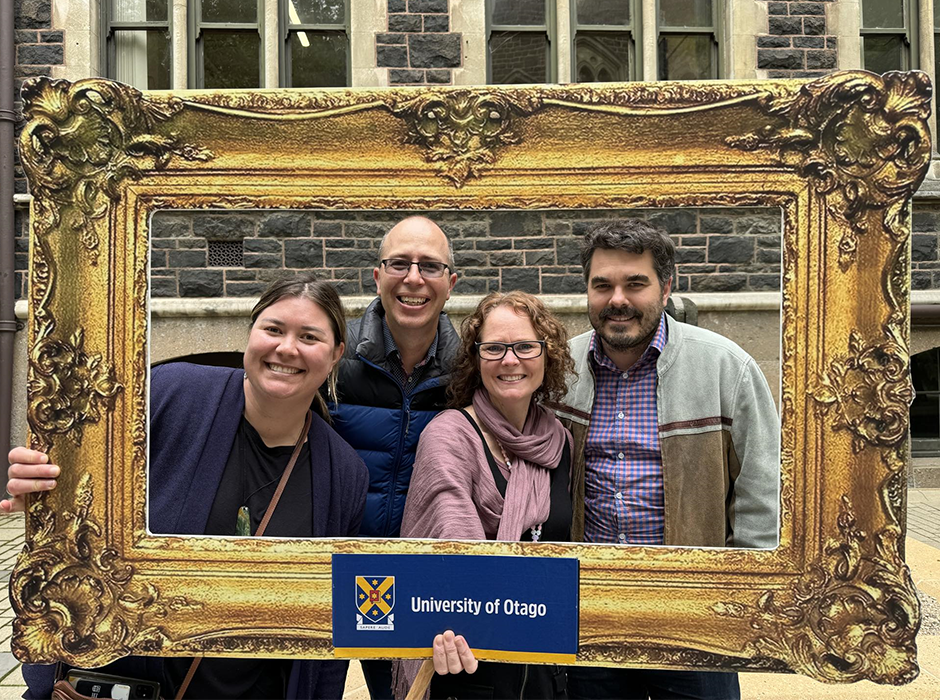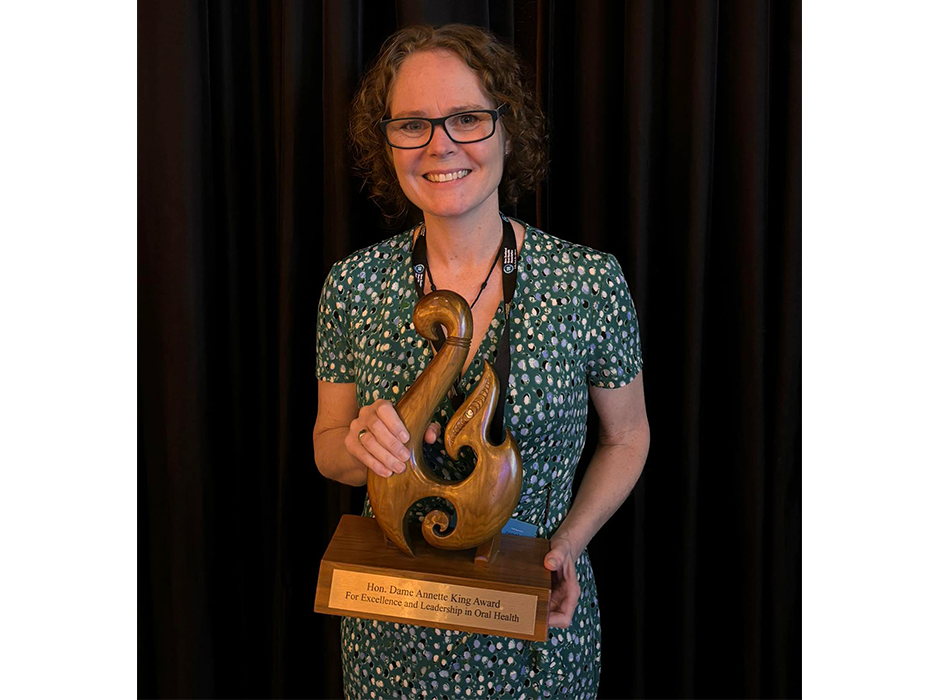
From left to right: Dr Carolina Loch, Professor Ben Wheeler, Dr Deanna Beckett and Professor Jonathan Broadbent celebrating the submission of Deanna’s doctoral thesis – they were also Deanna’s PhD supervisors.
Dr Deanna Beckett’s dedication to oral health has been recognised with a prestigious award – one that came as a surprise to the University of Otago Dental Therapist.
Deanna had no idea she had been nominated for the Hon. Annette King Award for Leadership and Excellence in Oral Health, so finding out when she was greeted with congratulations from her colleagues when she arrived at work one day, was a very pleasant surprise.
“It was nice to know someone thought of me and so I want to acknowledge my colleagues in Department of Oral Sciences, my supervisors, and the wider Faculty of Dentistry and University – we all support each other so well,” Deanna says.
Awarded by the New Zealand Oral Health Association, her nomination for the award centred around her being a dedicated mentor in oral health therapy education, her work as Associate Editor for the ANZ Journal of Dental and Oral Health Therapy, leading the executive committee of the College of Oral Health Academics, and her groundbreaking PhD research, recognised as Exceptional by the University of Otago.
Building on Professor Ben Wheelers 2012 research into vitamin D during pregnancy, at birth, and during early infancy, Deanna’s 2022 and 2023 PhD research investigated the dental health of children from that study at age six and compared this to their previously collected vitamin D data.
This revealed that pregnant mother’s vitamin D levels may affect the teeth of their offspring and that children birthed by mothers with a vitamin D deficiency had three times the risk of having dental decay by the time they were six years old.
She also collected an exfoliated baby tooth from participants for laboratory analysis and identified that children born with satisfactory vitamin D levels had better enamel crystalline quality.

University of Otago Dental Therapist Dr Deanna Beckett receives the New Zealand Oral Health Association Hon. Annette King Award for Leadership and Excellence in Oral Health.
It’s the first time in the world researchers have been able to examine an exfoliated tooth in a laboratory and compare it to the vitamin D status of the tooth at the time it was forming because identifying vitamin D levels of mothers during their pregnancy, and children at birth, is not a routine practice.
While not the initial intention, the dental component of this research has become a longitudinal study and is being repeated now that the children are almost 12 and due to lose their last baby tooth, the tooth most likely to have enamel defects, which will be collected for further analysis.
Tooth enamel cannot rebuild itself when it is lost, therefore, if there’s a problem when the teeth are forming, it’s there for life, Deanna says.
Enamel’s inability to repair makes it a very useful potential surrogate for measuring and understanding how important vitamin D for bone health, so these findings may be useful from a medical perspective as well.
“In Dunedin we don’t get much sunlight which is the main source of vitamin D and so those of us living here are highly likely to be deficient so this research may help provide evidence to make a case for supplementing this during pregnancy,” she says.
“After all, what the mother has is a good picture of what the babies will have and so setting them up well in their early life is the best thing we can be doing for our community.”
Deanna is extremely grateful to the participants and their parents, her PhD supervisors Professor Ben Wheeler, Professor Jonathan Broadbent, and Dr Carolina Loch for their support and expertise, the Otago Micro and Nanoscale Imaging unit for their assistance and facilities, and the Department of Chemistry staff for their help and advice analysing tooth samples.
Her ongoing research has been made possible thanks to funding from the Otago Medical Research Foundation (Laurenson AwardLA282), the Health Otago Charitable Trust, the NZ Ministry of Health Research Fund, and the University of Otago (UORG) grant.
Kōrero by the Division of Health Sciences Communications Adviser Kelsey Swart.